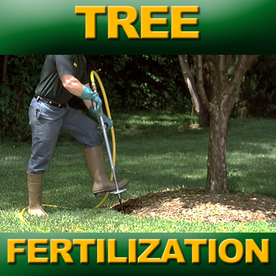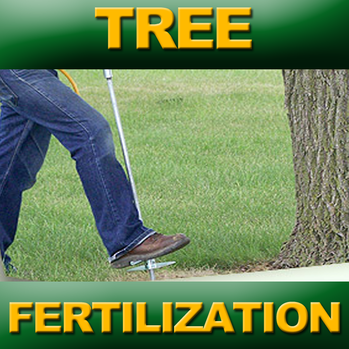|
|
FOR SERVICE CALL NOW 214-414-0386Tree fertilization is a very important part of your trees health and longevity. Depending on the area of the country that you live in there possibly could be deficiencies in the nutrients in that soil.
Tree fertilization will restore an equal balance to all the nutrients that are lacking in your ground. Call one of our trained arborists to come visit your location today we can help analyze what are the nutrients in your soil. |
Here's a break down of the process of tree fertilization

Trees require nutrients just like anything else on this living planet. When there is a nutrient deficiency, a tree will never grow up to its true potential in the landscape where it is planted.
Finding out if the tree is healthy or not can be determined by getting sample soils from the base of the tree and sending them off to Texas A&M University laboratories to be tested for nutrients.
When trees are planted in a lack of nutrient environments they will experience slow growth and also be more subject to disease in their lifespan. A lack of certain nutrients can also shorten the lifespan of the tree.
We will break this down into two simple categories for you to understand; one is called macro- nutrients and the other is micro -nutrients.
First, trees and plants alike need very little micro- nutrients but quite a bit of macro- nutrients to sustain their overall lifespan and a healthy growing process.
For example micro-nutrients are specially made up of nitrogen, magnesium, zinc, copper, boron, chlorine, and molybdenum. Trees need very little of these nutrients to survive in their environment and thrive. But they are important and a lack of these can result in a tree not growing properly and being held back from its true potential.
The other nutrients are the ones that trees use the most and these are called macro - nutrients. First on the list and very important is nitrogen, phosphorus, potassium, calcium, magnesium, and sulfur .
As soon as the results come back from Texas A&M University laboratories, one of our tree arborists will go back out to your location and break down the report.
Please keep in mind fertilizer sold in a regular store is not the same as what a trained arborist will be laying down on your property. We take into consideration the findings and base our mixture on those findings.
For example if your soil is lacking nitrogen and then our mixture will be mainly composed of nitrogen and so forth and so on for all the other components and nutrients that you're soil might be lacking.
It is essential that you call a trained arborist to lay down the proper fertilization for your trees; not following these instructions could result in the loss of your plantation.
Finding out if the tree is healthy or not can be determined by getting sample soils from the base of the tree and sending them off to Texas A&M University laboratories to be tested for nutrients.
When trees are planted in a lack of nutrient environments they will experience slow growth and also be more subject to disease in their lifespan. A lack of certain nutrients can also shorten the lifespan of the tree.
We will break this down into two simple categories for you to understand; one is called macro- nutrients and the other is micro -nutrients.
First, trees and plants alike need very little micro- nutrients but quite a bit of macro- nutrients to sustain their overall lifespan and a healthy growing process.
For example micro-nutrients are specially made up of nitrogen, magnesium, zinc, copper, boron, chlorine, and molybdenum. Trees need very little of these nutrients to survive in their environment and thrive. But they are important and a lack of these can result in a tree not growing properly and being held back from its true potential.
The other nutrients are the ones that trees use the most and these are called macro - nutrients. First on the list and very important is nitrogen, phosphorus, potassium, calcium, magnesium, and sulfur .
As soon as the results come back from Texas A&M University laboratories, one of our tree arborists will go back out to your location and break down the report.
Please keep in mind fertilizer sold in a regular store is not the same as what a trained arborist will be laying down on your property. We take into consideration the findings and base our mixture on those findings.
For example if your soil is lacking nitrogen and then our mixture will be mainly composed of nitrogen and so forth and so on for all the other components and nutrients that you're soil might be lacking.
It is essential that you call a trained arborist to lay down the proper fertilization for your trees; not following these instructions could result in the loss of your plantation.



